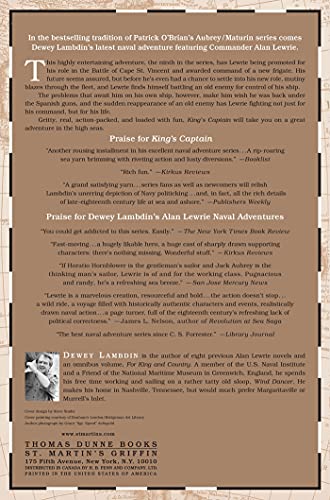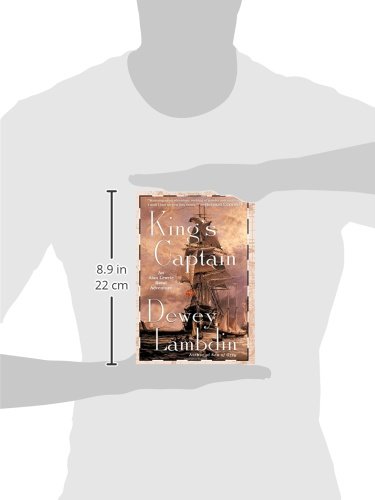



Full description not available
D**N
Good Treatment of the Spithead and Nore Mutinies
People seem to either love or hate this book's focus on action ashore and in harbor; count me among those who love it. The overall plot of the series is advanced in important ways (which aren't necessarily enjoyable to our protagonist). This is the book where Alan Lewrie's trajectory, both personal and professional, reaches a sort of apogee and then levels off into a series of peaks and valleys. He finds that there are limits to his ability to conduct both sides of his life. One could consider this volume and its sequels to be the beginning of a long-term "Reverse of the Medal" in Lewrie's life. I enjoyed the depiction of the Nore Mutiny - much more an attempt at revolution than what was basically a strike for better working conditions and pay than Spithead - and the beginning of the inevitable comeuppance in our hero's personal life, the former because of the excellent depiction of an important social and political event, and the latter because it gives the feel of a Greek tragedy. I highly recommend this volume.
F**D
Mutiny at the Nore
Alan Lewrie, at the end of the last novel (Jester's Fortune), was withdrawing from the Adriatic as part of the British withdrawal from the Mediterranean in late 1796. This story skips forward and begins with the Battle of Cape St. Vincent in early 1797. Admiral Jervis is depicted out of character, praising Lewrie without promoting him. Jervis had the authority to promote officers he approved of and would have immediately done so if he approved of Lewrie. The real life Peter Puget received such a promotion from Jervis, even though he arrived after the battle (Puget was known from earlier accomplishments).After a return to England to put the Jester into the dockyard, and a reconciliation between Lewrie and his father, the main part of this novel deals with the mutiny at the Nore after Lewrie is promoted and takes command of a frigate. He is confronted by an old enemy he cannot identify, and a crew split between mutineers and loyal men. The story contains little action at sea - when Lewrie is not on land, he is mainly aboard ship at anchor dealing with the mutineers. A side issue arises when someone writes a poison pen letter revealing Lewrie's past indiscretions. Overall, the novel is more about personalities than about naval action. It covers a relatively short period of time in 1797.For novels more action-filled, covering the same time period (including the mutiny), the reader is referred to Richard Woodman's, "A King's Cutter," and C. Northcote Parkinson's, "The Fireship."
S**R
Rollicking Good Fun...and a little educational too!
Damn fine stuff! Rollicking! Swashbuckling, or darn near. A bit "soap opera"-ish at points, and a little too dependent on previous books. (This is, of course, par for the course for "series" books.)I don't know if it's just me, but the Kindle version was bollixed: the first two chapters were shoved all the way to the end of the book! I felt something was missing at the book's opening! Yeah! The first too bloomin' chapters!The series is a little "saltier" than the other great series of naval adventures. More cussing, more drinking, more rutting. Way more cussing. (How can you have a story about sailors without the use of strong language?) This makes the series fit, I think, for mature readers only. But the books are darn fine page-turners, with interesting characters, fascinating situations, and some eye-opening historical education for the reader who is eager to learn.
F**N
in Which both our Hero and our Author make "Post Captain"
Patrick O'Brian set the tone and future development of his masterful seafaring series in book two, 'Post Captain', and Dewey Lambdin appears to have chosen to change tack and emulate the master's style and direction here in book nine of his fine series. In 'King's Captain', he appears to have decided to grab the opportunity to fill the void left by Mr. O'Brian's passing. Previously we were presented with a rollicking naval adventure series; now we seem to be settling into a more subtle, complex view of our hero and the socio-political events of the time. In this installment, Alan Lewrie joins Horatio Nelson in glory at the Battle of Cape Saint Vincent, is finally promoted to post-captain, spends a lot of time attempting to adjust to home, hearth, wife and children before being rescued from his ambivalence about this stagnant life by the mutinies at Spithead and the Nore. Not much else happens, but this consciously slower pace allows us to watch Lewrie's personal development and Lambdin's literary development as much more attention is placed on period detail, language, pun and allusion to the delight of O'Brian fans. Loved the "Are You Being Served?" schtick, though perhaps a slim paintbrush rather than a trowel might have improved the application. One criticism: stop with the "quotation marks" around each charming 'period' word; we Aubrey/Maturin fans can handle this stuff straight. Fans of this feisty series, don't worry! 'Ram-Cat' Lewrie is still handy with pistol and sword, Lambdin's tongue remains firmly in his cheek throughout and it is not he who makes any claims of picking up O'Brian's mantle, but I for one am loving it! "Three Cheers...!"...
D**N
An interesting chapter in the saga, but . . .
It's been years since I've indulged in this series, and as a student of history, the inclusion of actual events in a story is almost always cool for me, but . . . there was very little naval action. Promoted to Captain, Lewrie gets a new ship, and the story revolving around her is somewhat pagan, but enjoyable. The drag of the novel is that the mutiny just doesn't read well, and our heroes' role in combatting it was hard to read. There was also movement in the continuing story of Alan Lewrie, and not all of it for the good. Overall, it was an OK read, but the action was minimal.
K**R
A very interesting read
The latest novel in the series isn't as exciting as the previous ones, but it is very interesting in that it concentrates on the Naval mummies of the the 1790s. There is still some blood and thunder and the story is excellently weaved into real historical p!aces and with real named individuals. The final twist leaves you half approving and half disappointed in the revelations that are given out. I've no doubt Lewrie will squirm his way out, indeed I fervently hope so
P**.
Very unusual subject.
,Most stories of naval warfare in the days of sail make minimum reference to the mutinies at Spithead and the Nore but avoid dealing with the subject in detail. Dewey Lambdin tackles it head on from the inside, describing the many facets of the conflict with insight and accuracy. All this as little more than background to another cracking good yarn.
H**Y
Unbelievable
Total rubbish,unworthy of such an author.Fantasy is an understatement.True history shouldn’t be bastardised.The mutiny of the British Navy sailors was a very serious issue not to be trivialised.
K**R
Ram cat caught!
4 stars because it's an excellent story spoiled by hyphenated words that shouldn't be, spellings that make no sense in either UK or American English. An excellent story none the less, especially the use of the Old Gods, sailors being superstitious even today, I still believe in them too!
R**.
Another great Read
Lt Alan Lewrie gets his well earned promotion and get his new Command, unfortunately the Ship may not like Protestants!
Trustpilot
3 weeks ago
2 months ago